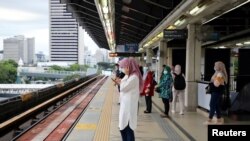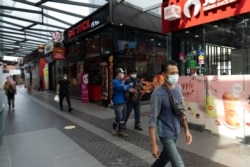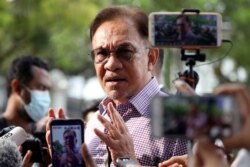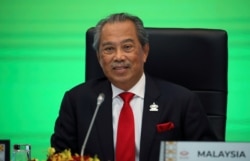The Malaysian government’s surprise state of emergency, declared this week to help beat back a surging coronavirus outbreak, may be more of a bid by Prime Minister Muhyiddin Yassin to preserve his slipping grip on power, some analysts say.
The country’s constitutional monarch, Al-Sultan Abdullah, declared a nationwide state of emergency for the first time in over 50 years on Tuesday at Muhyiddin’s request.
Malaysia counted a record 3,309 new COVID-19 cases the same day, in the midst of its worst wave of infections since the pandemic began. The country of 32 million has logged more than 144,000 cases in all to date, over half of them since early December.
Viral imperative
In a televised address on Tuesday, Muhyiddin said the outbreak was pushing Malaysia’s health care system to the breaking point. He insisted the emergency declaration was not a coup but added that it would allow the police and military to have extra powers to fight the pandemic.
"I implore you to remain calm during the emergency period, as well as all politicians, youths, non-governmental organizations and all levels of society to work as one to fight the pandemic. Hopefully we can level the infection curve and ease the strain on the health care system," he said.
Opposition parties were quick to dismiss the emergency as a ploy to save Muhyiddin’s teetering administration, however, and some analysts say they may be right.
The proclamation suspends parliament and blocks any elections until August 1. It also gives Muhyiddin and his cabinet the power to introduce new laws on their own.
“It’s more about holding on to power, but the mechanism would not have been possible without the pandemic being there,” said Bridget Welsh, an honorary research associate with the University of Nottingham's Asia Research Institute in Malaysia.
The king appointed Muhyiddin prime minister in late February after a sudden shift in political alliances brought down the seated government, ushering in a new ruling bloc of parties without a general election.
The bloc has looked brittle from the start. It has won a handful of votes in parliament by the slimmest of margins and the largest allied party, the United Malays National Organization, has been grumbling about losing out on coveted cabinet posts to Muhyiddin’s smaller Bersatu party. Hoping to take the reins, UMNO has called for fresh elections, and two party lawmakers openly pulled their support for Muhyiddin in the past week.
Popular opposition leader Anwar Ibrahim also claimed in September to have cobbled together the support of a majority of lawmakers to wrest control from Muhyiddin, but he has yet to prove it.
Power play
“The catalyst clearly was staying on,” Welsh said of the emergency proclamation.
“The sense is that they need to move away from having to constantly be destabilized, so they’re relying on the levers that can potentially give them the space to stay in office. But …the narrative that they’re using is that this will help them with COVID.”
Wong Chin Huat, a political scientist at Malaysia's Sunway University, agreed.
“If really you just need to have a bit of extra power, if the current law doesn’t allow you, you can always convene the parliament just to pass through all those,” he said.
“This is not a situation where the whole country is in chaos. So the real reason [for] all this is really for him [Muhyiddin] to keep his power, so that the prime minister doesn’t have to face parliament, and to have a free hand to run the country until the emergency is over.”
Others are more cautious.
Adib Zalkapli, a director with Malaysia-based consulting firm Bower Group Asia, said it was too soon to brand the emergency order a power grab but added that the narrative that it was could gain traction.
“Given the influence of UMNO and also the popularity of the opposition front, in terms of the numbers in parliament and all, it’s a perception that the prime minister has to address. He has to show in his actions moving forward that the emergency declaration is fully about COVID-19,” he said.
Gloves off
The government has yet to use its new emergency powers or spell out exactly what dictates could be on the way.
Non-government groups have started to raise alarms that those powers may be abused.
In a statement Wednesday, Malaysia’s Center for Independent Journalism warned that the emergency order foreshadowed a crackdown on government critics.
“People are hoping that they don’t do that, but the problem is that they’re worried that they might because the basic institutional powers protecting democratic governance and providing for checks and balances in the system have been removed,” said Welsh.
Muhyiddin’s critics say the space for free speech has been shrinking since he took office, pointing to the spate of investigations police opened last year on journalists, rights workers and lawmakers questioning his government’s tactics.
Welsh believes Muhyiddin’s team has nonetheless allowed “a fair amount of openness” on social media and beyond. But she said it may yet be tempted to use its new emergency powers for ill if it fails at using them for good, as promised, to bring the pandemic under control.
“The problem is, for any politician in any country, that when they’re not able to deliver on that, they rely on the levers of power,” she said.
And with the usual checks and balances now swept aside, she added, “they have those levers at their disposal.”








